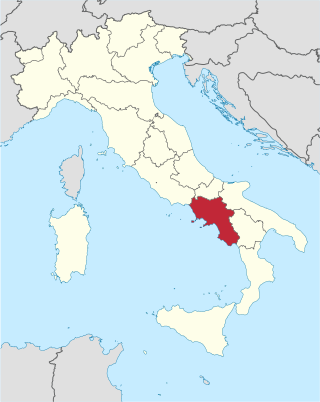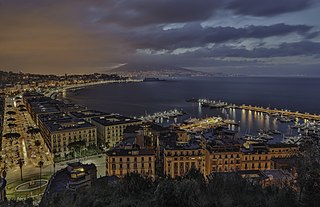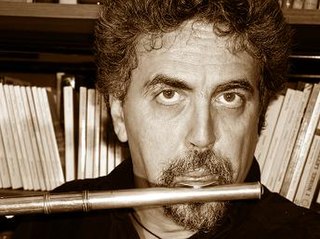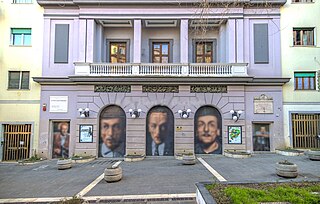
Campania is an administrative region of Italy; most of it is in the south-western portion of the Italian peninsula, but it also includes the small Phlegraean Islands and the island of Capri. The capital of the Campania region is Naples. As of 2018, the region had a population of around 5,820,000 people, making it Italy's third most populous region, and, with an area of 13,590 km2 (5,247 sq mi), its most densely populated region. Based on its GDP, Campania is also the most economically productive region in southern Italy and the 7th most productive in the whole country. Naples' urban area, which is in Campania, is the eighth most populous in the European Union. The region is home to 10 of the 58 UNESCO sites in Italy, including Pompeii and Herculaneum, the Royal Palace of Caserta, the Amalfi Coast and the Historic Centre of Naples. In addition, Campania's Mount Vesuvius is part of the UNESCO World Network of Biosphere Reserves.

Naples is the regional capital of Campania and the third-largest city of Italy, after Rome and Milan, with a population of 909,048 within the city's administrative limits as of 2022. Its province-level municipality is the third-most populous metropolitan city in Italy with a population of 3,115,320 residents, and its metropolitan area stretches beyond the boundaries of the city wall for approximately 20 miles.

Enzo Nini is a jazz saxophonist and flautist. He was born in San Giorgio a Cremano, Naples, Italy.

The National Theatre of Scotland, established in 2006, is the national theatre company of Scotland. The company has no theatre building of its own; instead it tours work to theatres, village halls, schools and site-specific locations, both at home and internationally.

Roberto Paci Dalò is an Italian author, composer and musician, film maker and theatre director, sound and visual artist, radio-maker. He is the co-founder and director of the performing arts ensemble Giardini Pensili and he has been the artistic director of Wikimania 2016 Esino Lario. He won the Premio Napoli per la lingua e la cultura italiana in 2015.
Vanishing Point theatre company was founded in Glasgow in 1999 by Matthew Lenton.

Theatre NO99 was a theatre in Tallinn, Estonia that began to operate in February 2005. It was a state-owned repertoire theatre that has its own building with two theatre halls in central Tallinn. The theatre closed in 2019.
Giuseppe Picone is an Italian principal ballet dancer, choreographer, artistic director of the Ballet Company of Teatro San Carlo in Naples.
East West Theatre Company was established in 2005 in Sarajevo, Bosnia and Herzegovina. It is a nonprofit cultural institution which produces performing arts programs, publications, films, and music events. It also organizes touring shows, discussions, forums, master-classes and workshops. Important components of its work include a creation of new work and a commitment to international cooperation.

Football, Football is a theatre show produced by the East West Theatre Company in cooperation with Napoli Teatro Festival Italia, Singapore Arts Festival, Flota Institute from Slovenia, Ballets C. de la B, and patronage by Fondazione Cannavaro Ferrara Napoli Teatro Festival. Football, Football was directed, conceived and written by Haris Pašović. Since the opening in May 2010, it has been performed for fifteen times on three continents. The artists from four continents and seven countries participated in this project.

Teatro San Ferdinando is a theatre in Naples, Italy. It is named after King Ferdinand I of Naples. Located near Ponte Nuovo, it is to the southeast of the Teatro Totò in the western part of the neighborhood of Arenaccia. Built in the late eighteenth century, the seats are arranged in four box tiers, and the pit. It is most associated with Eduardo De Filippo and the productions of the 1950s under his direction. Closed in the 1980s and reopened in 2007, the San Fernando is managed by the Teatro Stabile of Naples.
The Europe Theatre Prize(Premio Europa per il Teatro) is an award of the European Commission for a personality who has "contributed to the realisation of cultural events that promote understanding and the exchange of knowledge between peoples". "The winner is chosen for the whole of his artistic path among notable personalities of international theatre considered in all its different forms, articulations and expressions". The prize was established in 1986 when Carlo Ripa di Meana was first Commissioner of Culture. In those years a contribution to its creation also came from Melina Mercouri, who was patroness of the Prize, and from Jack Lang, then French Minister of Culture and current President of the Prize. The European Parliament and the European Council have supported it as a "European cultural interest organisation" since 2002.
The Teatro Stabile di Catania is a theatrical institution based in Catania, Sicily, Italy which was formed in 1958. It has two theatres, the Teatro Giovanni Verga, the Teatro Angelo Musco. Annually, the program offers a choice of many shows, partly self-produced. It is the first permanent theatre in the South of Italy.

Anton Michailovič Milenin is a Russian theatre actor, director and teacher who has worked in Italy and Russia for more than fifteen years, rector of UNIVERSAL ACADEMY OF HERMENEUTICS.

Marco Calvani is an Italian playwright, director, filmmaker, translator and actor.

Fiorenza Calogero is an Italian world music singer and actress from Naples, Italy.
Annibale Ruccello was an Italian playwright, theatre director, and actor.
Incanti is a yearly theatre festival held in Torino, Italy, since 1994. Amongst the main patrons are the Italian Ministry of Cultural Heritage, the Piemonte Region, the Municipality of Torino, and the foundations Compagnia di San Paolo and Fondazione CRT. The festival was created in 1994 by the cultural association Controluce Teatro d’Ombre as an experiment hosted in the small theatre at the Castello di Rivoli museum of contemporary art; it bore the name Incanti, International Festival of Figure Theatre. Starting from 2002, the press acknowledged how Incanti, “from a refined niche festival, a precious gem for a selected audience, has converted to one among the most reputed figure-theatre shows across Europe,” addressing mainly an adult audience and featuring a programme that includes both tradition and experimentation, where multi-media shows highlighting the links between performance, music, visual arts and poetry play a key role.

The Teatro Nuovo is a theatre located on Via Montecalvario in the Quartieri Spagnoli district of Naples. The original theatre was an opera house designed by Domenico Antonio Vaccaro. Completed in 1724, it was also known as the Teatro Nuovo sopra Toledo and the Teatro Nuovo de Montecalvario. The theatre specialised in the opera buffa genre and saw the world premieres of hundreds of operas in its heyday. These included fifteen of Cimarosa's operas and seven of Donizetti's. The present theatre is the third to have been erected on the site following its destruction by fire in 1861 and again in 1935.

The European Theatre Convention (ETC) is a European theatre association founded in 1988.
















